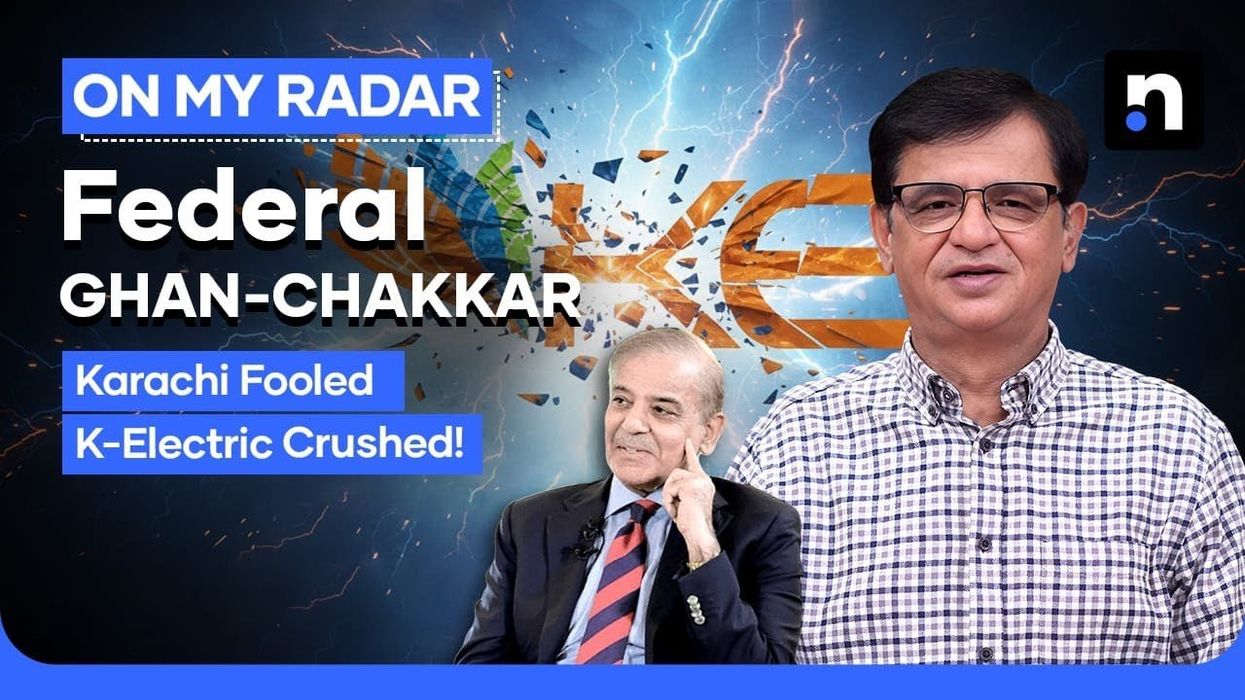Karachi’s power crisis deepens as K-Electric reels from tariff shock, investor turmoil
Kamran Khan says Nepra’s tariff cut brings no relief for Karachi consumers, only benefits the federal government
News Desk
The News Desk provides timely and factual coverage of national and international events, with an emphasis on accuracy and clarity.
The federal government’s latest bid to ease electricity costs has instead left Karachi’s power supplier, K-Electric, facing a potential financial collapse, according to Kamran Khan.
In his latest episode of “On My Radar,” Khan said the federal government’s decision, which appeared to reduce Karachi’s power tariff, is misleading and financially disastrous for the company. “The government tried to create headlines about cheaper electricity, but in reality, it has pushed K-Electric toward ruin,” he said.
Earlier this week, national media reported that the National Electric Power Regulatory Authority (Nepra) had reduced K-Electric’s base tariff by PKR 7.60 per unit — from PKR 39.97 to PKR 32.37 — sparking public celebration over apparent consumer relief.
However, Kamran Khan said the move is a “regulatory illusion” that will not reduce a single rupee in consumer bills. “This is not relief for Karachi. It’s relief for the federal government, which will cut its subsidy bill while K-Electric bears the brunt,” he noted.
No benefit for consumers
According to Khan, the revised tariff decision will not apply to actual consumer bills. Instead, Nepra changed the fuel cost reference — allowing K-Electric to recover an additional PKR 28 billion through fuel adjustments, effectively negating any benefit for consumers.
“The people of Karachi have been deceived,” Khan said. “The 7.6-rupee reduction will only help the government meet IMF demands to reduce subsidies. It saves the government billions, not the citizens.”
Khan said the move will have devastating consequences for K-Electric’s finances. The company, which was profitable last year, now faces losses exceeding PKR 80 billion to 100 billion annually. “K-Electric’s entire balance sheet has been thrown off. It may not even be able to maintain power generation if banks and investors back away,” he warned.
The company reportedly canceled its annual general meeting to rework financial statements, as the new tariff renders previous accounts inaccurate.
Investor confidence shaken
The crisis, Kamran Khan added, extends beyond K-Electric’s balance sheet. The decision has rattled foreign investors — particularly the Saudi and Kuwaiti stakeholders who own majority shares through Al-Jomaih Power Limited.
“Just months ago, these investors were assured by the government that K-Electric’s issues would be resolved. Now, this abrupt policy U-turn has shattered that confidence,” Khan said.
Saudi deal controversy
Compounding K-Electric’s troubles is a growing dispute over a recent memorandum of understanding (MoU) involving Saudi Prince Mansour bin Mohammed Al Saud. Two weeks ago, local media reported that the prince had signed an MoU to acquire 53.8 percent of K-Electric’s shares.
But Al-Jomaih Power, the current majority shareholder through KES Power, denied knowledge of any such deal. In a letter to the Pakistan Stock Exchange, the company said it was neither informed nor consulted and claimed that the individual who signed the MoU, Pakistani businessman Shehryar Chishti, was “not authorized to sell shares.”
Al-Jomaih described the event as “a photo opportunity” meant to create publicity rather than reflect a legitimate transaction. It also noted that a legal case regarding K-Electric’s ownership remains pending in a Cayman Islands court.
Khan said this episode has further eroded investor trust. “When major Saudi investors say they were blindsided by such a transaction, it sends a dangerous signal about Pakistan’s business environment,” he warned.
Khan said the back-to-back controversies — the tariff reversal and the disputed Saudi investment — reflect “regulatory chaos” and poor governance. “Nepra’s sudden change, under alleged pressure from the Power Division, shows how erratic policymaking can destabilize entire sectors,” he remarked.
Implications for Riyadh trip
Khan also questioned the timing, noting that Prime Minister Shehbaz Sharif and Field Marshal Asim Munir are set to attend the Saudi Investment Conference in Riyadh next week. “What will they tell investors — that Pakistan honors commitments or that we reverse decisions overnight?” he asked.
He concluded that the ongoing turmoil has turned K-Electric into “a case study of bad governance, regulatory confusion, and shattered investor confidence.”
“After 20 years of privatization, Karachi’s power company is still entangled in chaos,” Kamran Khan said. “And now, the same uncertainty threatens Pakistan’s entire privatization program.”











Comments
See what people are discussing